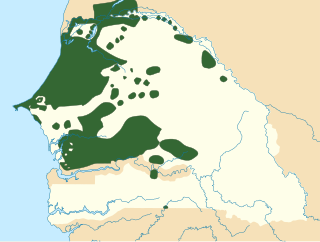| Wolof | |
|---|---|
| Wolof làkk, وࣷلࣷفْ لࣵکّ | |
| Native to | Senegal, Gambia, Mauritania |
| Region | Senegambia |
| Ethnicity | Wolof |
Native speakers | L1: 7.1 million (2013–2021)[1] L2: 16 million (2021)[1] |
| Dialects |
|
| Latin (Wolof alphabet) Arabic (Wolofal) Garay | |
| Official status | |
Official language in | Senegal |
| Regulated by | CLAD (Centre de linguistique appliquée de Dakar) |
| Language codes | |
| ISO 639-1 | wo |
| ISO 639-2 | wol |
| ISO 639-3 | Either:wol – Wolofwof – Gambian Wolof |
| Glottolog | wolo1247 |
| Linguasphere | 90-AAA-aa |
 Areas where Wolof is spoken | |
Wolof (/ˈwoʊlɒf/ WOH-lof;[2] Wolof làkk, وࣷلࣷفْ لࣵکّ) is a Niger–Congo language spoken by the Wolof people in much of the West African subregion of Senegambia that is split between the countries of Senegal, The Gambia and Mauritania. Like the neighbouring languages Serer and Fula, it belongs to the Senegambian branch of the Niger–Congo language family. Unlike most other languages of its family, Wolof is not a tonal language.
Wolof is the most widely spoken language in Senegal, spoken natively by the Wolof people (40% of the population) but also by most other Senegalese as a second language.[3] Wolof dialects vary geographically and between rural and urban areas. The principal dialect of Dakar, for instance, is an urban mixture of Wolof, French, and Arabic.
Wolof is the standard spelling and may also refer to the Wolof ethnicity or culture. Variants include the older French Ouolof, Jollof, or Jolof, which now typically refers either to the Jolof Empire or to jollof rice, a common West African rice dish. Now-archaic forms include Volof and Olof.
English is believed to have adopted some Wolof loanwords, such as banana, via Spanish or Portuguese,[4] and nyam, used also in Spanish: 'ñam' as an onomatopoeia for eating or chewing, in several Caribbean English Creoles meaning "to eat" (compare Seychellois Creole nyanmnyanm, also meaning "to eat").[5]
- ^ a b Wolof at Ethnologue (27th ed., 2024)

Gambian Wolof at Ethnologue (27th ed., 2024)
- ^ "Wolof". Oxford English Dictionary (Online ed.). Oxford University Press. (Subscription or participating institution membership required.)
- ^ "Wolof Brochure" (PDF). Indiana.edu. Archived (PDF) from the original on 2013-09-04. Retrieved 10 June 2018.
- ^ Harper, Douglas. "banana". Online Etymology Dictionary. Retrieved 6 March 2016.
- ^ Danielle D'Offay & Guy Lionet, Diksyonner Kreol-Franse / Dictionnaire Créole Seychellois – Français, Helmut Buske Verlag, Hamburg, 1982. In all fairness, the word might as easily be from Fula nyaamde, "to eat".